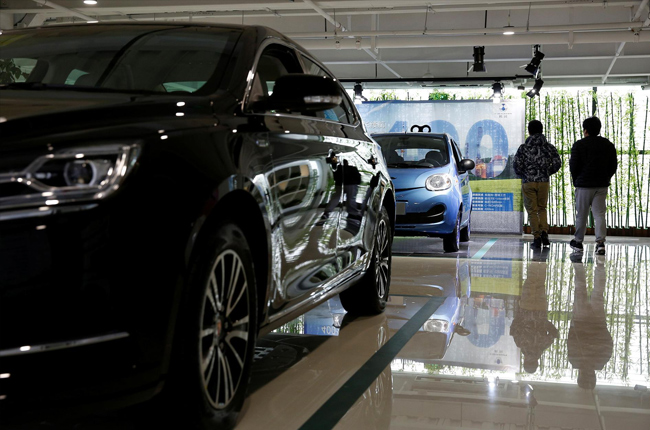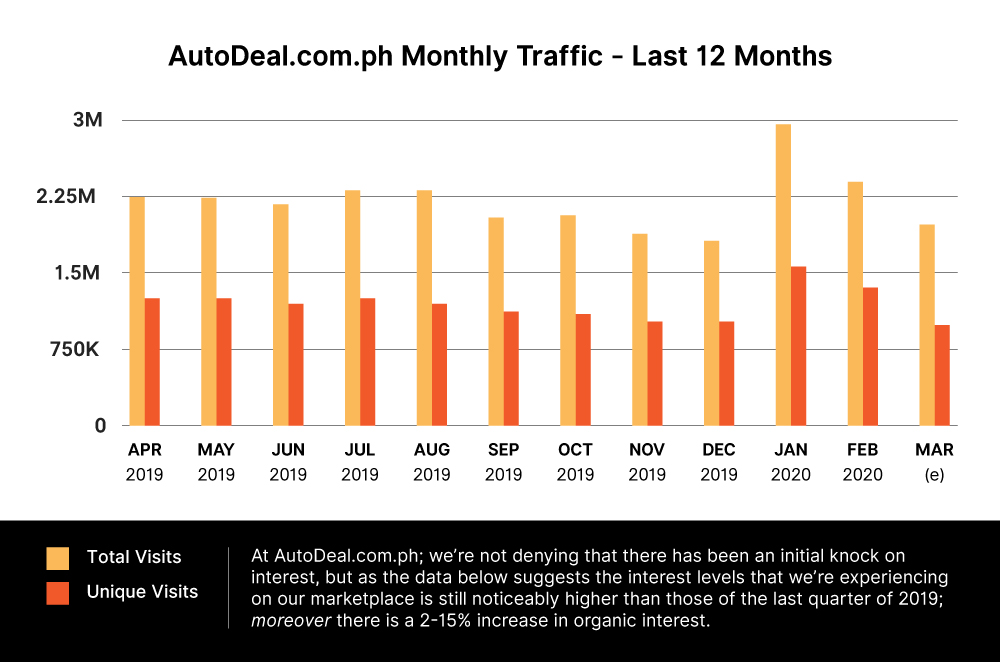
As of April 3, 2020, up to 99% of dealerships in China have opened their doors to the public once again according to the China Automobile Dealers Association. Wuhan, the epicenter of the COVID-19 outbreak, is experiencing a boom of a recovery back to normal numbers and operations. There are several key factors to the speed of this development. Certain assumptions can also be made based on our own site data. We also assume that the consumer behavior has the possibility to remain constant no matter the country.
After the lockdown was lifted in Wuhan, dealerships, as well as other businesses, gradually started to reopen their doors to the public. Instead of customers slowly trickling along with unit sales, dealerships in the region are reporting a boom of sales after the dealerships opened their doors again to customers. The two-month period of inactivity for these dealers has resulted in a surge of unexpected sales. Initially, the businesses thought that sales would be frozen in place, seeing as the global market is in a bind.
During the crisis, nationwide sales figures were reported to have dropped by 96%. According to the China Passenger Car Association, during the first three weeks of March 2020, the country-wide drop in sales decreased to 50%, 44%, and 40%, respectively. Compared to March last year, sales are down by only 40%. The association predicts that weekly sales will rebound by the end of April, based on the market’s upward recovery trend. Consumer traffic is on its way back and is 66% of normal levels as of April 3, 2020.
Pent up buying potential
As stated earlier, the two months of inactivity in the market has resulted in consumer purchases flowing in once the floodgates to the dealerships were opened. According to Bloomberg, a sales representative for Audi in Wuhan, Zhang Jiaqi, stated “It’s like a boom after a two-month dormancy. I thought sales would be frozen,” while referring to the influx of sales returning to levels recorded a year earlier.
It was likely that consumer buying plans were put on hold during the lockdown. The period has also given consumers time to recollect and decide on their first or next purchase, likely researching and browsing through the use of online websites and media. It can be inferred that consumers who have wanted to buy a car before the pandemic, are still looking to purchase one if they haven’t already. The excitement in purchasing a new car also could have been pent up, and upon the news of dealerships opening up again, a flood of customers seeking to follow through with their plans flowed into automotive businesses.
Personal Transportation
Due to the virus’s ability to spread from person to person, public transportation became a definite risk for individuals looking to get around. Social distancing became a norm in Wuhan and the rest of the world. More personal forms of transport became more desirable for individuals to minimize exposure during their commutes.
Because of the risk that public transportation poses, there is more incentive in purchasing a personal vehicle. Human contact is minimized and can be controlled by the owner in a private vehicle, and buyers who were on the cusp of making a purchase now have one more reason to purchase a car for themselves to ensure mobility and safety.
New customers
Xia Tianyi, a Cadilac dealer’s sales representative in Wuhan stated that there are several first-time car buyers walking into the showroom. He also stated that healthcare professionals, including doctors, were among those looking for a car.
People who once took public transportation now find private cars to be a safer alternative. The pandemic has turned browsers into buyers. First-time buyers looking to purchase their own automobiles are seeing the benefits of private vehicle ownership over taking public transportation and risking their health.
What does this mean for the industry?
This could be a minor spike in consumer behavior, however, in the interest of health, we could see a high volume in sales with regard to consumers looking for a vehicle of their own in order to skip public transportation altogether. Especially in the Philippines where commuters travel in close proximity to each other, private cars can serve as means of transportation away from crowds. Though, with production facilities halting operations, it seems that the supply chain will experience delays.
After quarantine measures and lockdowns are lifted, awareness of viruses and diseases will still be at large in the months or years following the pandemic. There is a likelihood that more precautions will be taken in order to minimize risk.

Even without dealerships in the Philippines opening, there was an increase in consumer interest on AutoDeal.com.ph, wherein a 2% - 15% increase in organic interest has been tracked for March 2020 as compared to March 2019. Customers are still looking to buy cars, and some dealerships are also addressing their concerns, with companies like the Autohub group rolling out an online reservation promotion which promises less physical contact when reserving an automobile. It appears that there is hope for a new beginning in the automotive industry, though this won’t happen without key players making changes and innovations to adapt to current situations. Moving forward is always an option.
Source: Bloomberg
Latest Features
-
The 6 things every Ford Ranger must pass before it leaves the factory / Featured Article
Every Ford Ranger, from the base model to the Ranger Raptor, goes through a full inspection process before it leaves the factory. This includes six steps that make sure it’s ready to drive a...
-
Which GAC AION EV is best for your everyday lifestyle? / Featured Article
The GAC AION lineup has something for everyone, maybe you're after space, speed, or just a smooth city drive. Here's a quick breakdown of which model might work best for your day-to-day life...
-
The AutoDeal Awards 2024: Celebrating excellence in the auto Industry / Featured Article
The AutoDeal Awards 2024: Celebrating excellence in the auto Industry
Popular Articles
-
Cheapest cars under P700,000 in the Philippines
Jerome Tresvalles · Sep 02, 2024
-
First car or next car, the Ford EcoSport is a tough package to beat
Jun 18, 2021
-
Car Maintenance checklist and guide – here’s everything you need to know
Earl Lee · Jan 12, 2021
-
Most fuel efficient family cars in the Philippines
Bryan Aaron Rivera · Nov 27, 2020
-
2021 Geely Okavango — Everything you need to know
Joey Deriquito · Nov 19, 2020
-
Family cars in the Philippines with the biggest trunks
Sep 20, 2023
-
Head to head: Toyota Rush vs. Suzuki XL7
Joey Deriquito · Oct 28, 2020
-
Why oil changes are important for your car
Earl Lee · Nov 10, 2020
-
2021 Kia Stonic — What you need to know about it
Joey Deriquito · Oct 16, 2020
-
Top 7 tips for buying a used car in the Philippines
Joey Deriquito · Nov 26, 2020




